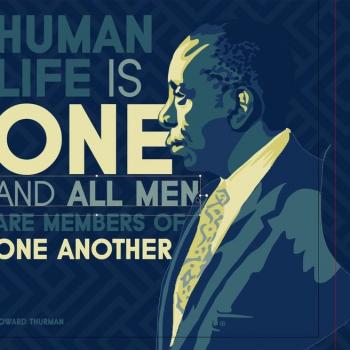I am not an evangelical. Or I don't think I am. I might have been one once, but I'm sure I don't want to be one now.
To be honest, I've never really known how to define the term "evangelical." What I do know is that in 2004, as that year's presidential campaign was in full swing, I began to hear a lot of talk about evangelicals, and I knew my Christian convictions lumped me into that group. At the same time, it was clear that my political convictions were quite far from the conservatism that was linked to the term.
Five years later, after another presidential campaign in which the specter of evangelicalism loomed large, David Sessions and I, identifying ourselves simply as The Editors of Patrolmag.com, published an editorial in which we beseeched our Christian brothers and sisters to "Get Over It" and accept the "near-certain extinction" of evangelicalism.
After years of identifying Patrol as a publication for post-evangelicals, a descriptor we borrowed from the late, great "Internet Monk" Michael Spencer, we had decided it was time to divorce ourselves completely from the overused, under-defined term. Evangelicalism, we predicted, was approaching its own demise. In response to this imminent threat, we observed, many evangelicals were battening down the hatches, digging further in, and defining and redefining what it means to be a member of their ranks.
This was two years ago, and despite the small furor our editorial caused—my favorite reaction came from D.A. Carson, who said that ours was "one of the most blistering and uncouth descriptions of evangelicalism"—evangelicalism is still around and we are still talking about its future.
This time it's mostly Rob Bell's fault. Now that his book is out and everyone is beginning to realize that his theology is really not worth arguing about, and that it was never his point that we should do so, the conversation has turned to what his book—and the reaction to it—says about evangelicalism as a movement.
Picking up that thread, Jimmy Spencer, Jr., author of Love Without Agenda, predicted an immanent split in evangelicalism, the fault lines of which he saw more clearly exposed in the wake of the Love Wins fiasco. I countered at Patrol that what was bound to happen was not so much a split as a continuation of the steady erosion that has been taking place for years. Although some disputed this, my friend and colleague Alisa Harris followed up on my highly speculative post with a piece detailing statistical evidence that this erosion is indeed in progress.
This is all very fun to talk about. But, I've come to believe, none of it matters.
Something is happening to evangelicalism. It is eroding and it may split, but it will hardly make a difference in the grand scheme of things. This is not because evangelicalism in America isn't an endlessly fascinating and important cultural phenomenon that will continue to be a force for years to come, but because it's just evangelicalism in America.
In 2009, around the same time Sessions and I were calling for an end to the use of the word evangelical, InterVarsity Press published an important book by Soong-Chan Rah entitled The Next Evangelicalism. Rah's thesis, that the next evangelicalism will come from the global church as opposed to the predominantly white, male-led evangelicalism of the United States, seems all the more prescient now in light of the Rob Bell kerfuffle.
In an insightful chapter on the emerging church phenomenon, which was winding down by the time his book was published, Rah does not fully dismiss the movement as other theologians of the time did, but suggests it did not go far enough. For all of the talk among post-moderns about diversity and multiculturalism, Rah says, the movement sure looks a lot like the evangelicalism it is responding to: white, male, and American.
Rah sums up the problem succinctly in his conclusion. "Instead of creating a Christian America," he writes, "evangelicals have Americanized Christianity." This "Americanized Christianity" is a more apt description of what we now call evangelicalism, and the disparities between this brand of Christianity and the global church form the lines along which evangelicalism is actually eroding. Through the lens of Americanized Christianity, Rob Bell looks much like John Piper; Justin Taylor may as well be Matthew Paul Turner. My frequent intellectual adversary (and friend) Matthew Lee Anderson looks very much like me (only he is much taller and I am more handsome).





